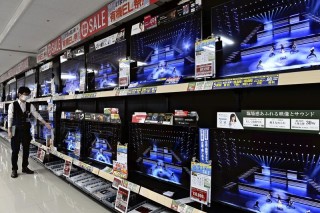Loading
Search
▼ Olympic Sponsors See Greatly Different Results
- Category:Event
The Tokyo Games brought starkly different results for businesses in Japan, with some benefiting and others seeing little impact from the Olympics.
Before the Olympics began, public opinion was divided over whether it was appropriate to hold the Tokyo Games, which ended Aug. 8, amid the ongoing pandemic. A series of scandals also emerged just before the start, involving officials in charge of the opening ceremony, and sponsor companies faced difficult choices over how to respond.
Once the Games began, the strong performance by Japanese athletes allowed some companies to target customers watching at home, but others saw fewer customers due to the rapid expansion of infections with the virus.
Without spectators
Official corporate sponsors were categorized into four ranks, depending on such factors as how much they paid in fees. The range of permitted advertising differed according to rank; the higher the rank, the greater the opportunities for exposure.
Asahi Breweries Ltd. signed a contract allowing it to sell beer and other alcoholic beverages at Games venues. But in the wake of the decision to hold most of the Olympic events without spectators, the company targeted demand among people who watched the competitions at home. For example, the company sold special six-packs of beer to promote its products.
In late July, sales of cans of Asahi’s Super Dry beer, one of the company’s flagship products, were brisk, up about 30% from a year ago. Sales continued to outperform the previous year’s level after the start of August.
A public relations official for Asahi said, “We were able to satisfy demand from people who watched Olympic matches at home.”
Aoki Inc. has sold suits with tags bearing the Tokyo Olympic emblem inside the jackets. Since the opening of the Games, sales of the suits increased 20%. More than 30,000 in the series have been sold since the suits’ release in 2019.
An Aoki PR official said, “Our customers’ interest in the Olympics rapidly increased due to the succession of medals won [by the Japanese athletes].”
Ajinomoto Co. provided frozen foods, such as dumplings and spring rolls, to the athletes village. A member of the U.S. rugby sevens team posted a video clip saying that the athletes village had the world’s most delicious dumplings, making the frozen foods became a hot topic online.
Subsidiary Ajinomoto Frozen Foods Co. tweeted on its official account, “It seems that Japanese dumplings also won a gold medal.”
Home electronics split
In addition to official sponsors, some firms recorded brisk sales of home electronics. Nojima Corp. saw higher sales of organic EL television sets, which can show high-resolution graphics at high speeds, and video recorders.
“The Japanese athletes’ remarkable performance may have been one reason why brisk sales continued even during the Olympics,” a public relations official for Nojima said.
Products to facilitate drinking while watching the Olympics at home also sold well. For example, sales of carbonated water makers in July were six times the level in July 2019, before the start of the novel coronavirus crisis.
An increasing number of consumers also bought portable takoyaki grills and fryers.
In contrast, an official of another large-scale chain of home electronics stores said it saw little benefit from the Olympics, as more areas were put under a state of emergency in tandem with the rapid increase in infections.
Customers at eateries in the stores’ buildings decreased because their service hours were shortened. Goods that might have sold strongly if the Games had been held with spectators, such as binoculars, cameras and portable electric fans, did not do as well as expected, the official said.
Voices of regret
Many of the sponsor companies worried about how to respond to demands that the Tokyo Olympics should be canceled.
On July 19, just before the opening, Toyota Motor Corp. announced that it would not air TV commercials in Japan related to the Tokyo Olympic and Paralympic Games. As Toyota is one of the highest-ranking sponsor companies, its influence was considered to be enormous.
An official of another sponsor company said, “Though our company prepared contracts with big-name entertainers, we didn’t air most of the TV commercials [so as to be in concert with Toyota]. But because some companies openly touted the Olympics, we were left behind.”
- August 11, 2020
- Comment (0)
- Trackback(0)


